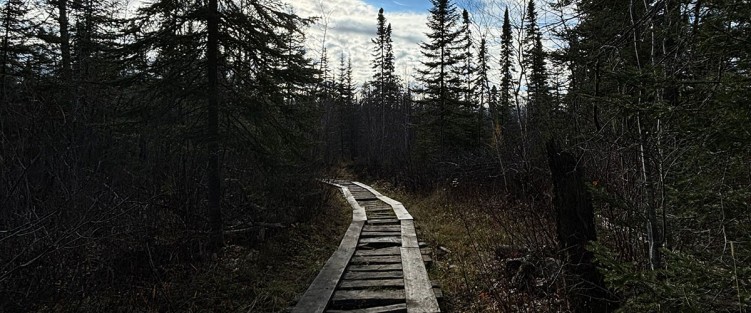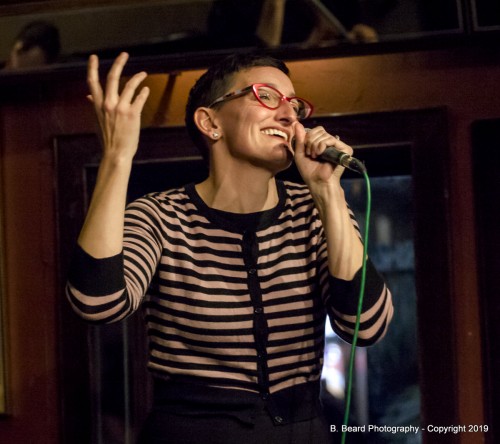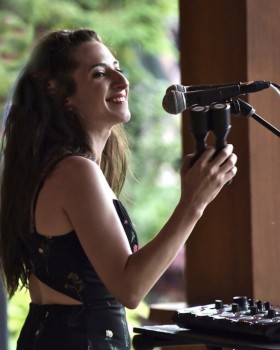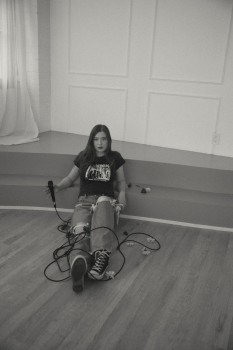 Shortly after I moved north I was having a conversation with one of my younger, wiser siblings, and they offered the general life philosophy that if you look at whatever it is you’re doing, and if it doesn’t scare the [expletive] out of you, it means you need to scale it up until it does. It was very good advice, and I offer it to you, at this time of year where people are often considering change in their lives.
Shortly after I moved north I was having a conversation with one of my younger, wiser siblings, and they offered the general life philosophy that if you look at whatever it is you’re doing, and if it doesn’t scare the [expletive] out of you, it means you need to scale it up until it does. It was very good advice, and I offer it to you, at this time of year where people are often considering change in their lives.
I would also add that scaling your idea up doesn’t necessarily mean making it bigger. As illustrated by the three wonderful musician-writers whose words follow, sometimes it’s just as scary to scale down.
Wishing you a very happy end to this year, and the courage to start 2025 in whatever terrifying and wonderful ways you choose!
Boomerang: Whitney Ross-Barris
 Vocalist Whitney Ross-Barris is a self-described Boomerang. Uxbridge, Ontario is where she grew up and had some of her earliest experiences as a musician, performer and writer.
Vocalist Whitney Ross-Barris is a self-described Boomerang. Uxbridge, Ontario is where she grew up and had some of her earliest experiences as a musician, performer and writer.
“I did theatre when I was a young teenager and was involved with music at school, but eventually I switched high schools from Uxbridge to Port Perry because Port Perry had a fantastic music program at that point. I did more music theatre, in their local theatre, but I also did every single instrumental and vocal ensemble I could be part of, and I loved it.”
The Port Perry program is still wonderful, she notes, but “now, Uxbridge is also great because it’s led by Amy Peck and she’s amazing.”
Barris, who is a multi-talented performer, musician, actor and writer made her “boomerang” return to Uxbridge in 2018, along with her husband and young children. And then COVID hit.
“I was stuck at home watching all the gigs dry up and the venues shut down. Guiding my two kids through online school and keeping my toddler entertained … slowly losing my (...) mind. And then I started to write at the piano. I had taken RCM piano lessons when I was a kid and had been a jazz singer and theatre actor up to that point but as far as being a real songwriter, I hadn’t really fully immersed myself as a soloist until then.”
It was also around then that she connected with local singer-songwriter Tania Joy, whose hard work and tenacity had helped bring about the post-pandemic recovery of the Downtown Uxbridge Springtide Festival, and who was running an open mic.
“She knew I was writing music and invited/encouraged/kicked my ass to come, in 2022, when they had a piano one night. So I came and played. I thought it was for just one song, but it turned out to be three! It was the first time I played my songs in front of people.”
This November, Barris took another huge leap.
“Jessica Stuart invited me to be in an episode of her ‘JS Presents’ songwriter series at the Tranzac. I’m really excited to be doing it. It feels like a real honour and very different to me to be spotlit as a songwriter and not just ‘that jazz singer’. I respect her a lot as a songwriter and a musician and a woman in music.”
Stuart offered her the opportunity to bring an accompanist, but she is choosing to go solo - even though “I still have a lot of hangups about playing piano in front of people.” I asked her whether there was a deciding factor in leaps of faith like this.
“It’s sort of heart-led ... This calm person in me always pushes. For good and for cuckoo. Sometimes she’s smart and leads with sense, sometimes she suggests I do something crazy in an audition, which has its own problems. But it’s like having an outside perspective on yourself. It can lead you to say yes to unfamiliar things when the rest of you is running away over the hill and into the countryside - which is how I started writing songs in the first place.”
By time of print, Whitney’s Tranzac episode will have already happened, but JS Presents continues, with Erik Schramek (Sat Dec 21), Thom Gil (Sat Jan 18), and Shawna Caspi (Sat Feb 15).
Looping Back: Jordana Talsky
 “I love the collaborative magic when working with others, but I find it challenging to stay present due to my busy mind. Leading a band and conveying my ideas can be tough.”
“I love the collaborative magic when working with others, but I find it challenging to stay present due to my busy mind. Leading a band and conveying my ideas can be tough.”
Jordana Talsky’s “busy mind” took her on an academic journey well outside the realms of music. Now, in navigating her equally important musical and creative journey, she explores whether her loop into law helped with the challenges she felt as a bandleader.
“The thing about the post secondary degree: I’m not saying you need to get it, but I do think that it gives you important tools to work with, like accepted practices of communication and technical jargon. I’ve always relied more on my ear, and I do think that the early training I received in choral settings, and perhaps also liturgical influences of Hebrew school, lent to a more intuitive musical understanding over clinical, which is maybe a common feature among singers, since the voice instrument is the most connected to the body, to the inside. Being a singer in a new musical community, I often felt self-conscious about expressing my thoughts and had a sense that I could not fully convey what I wanted. Solo work liberated me from these challenges.”
Her early choral training might also have been a factor in her eventual choice of “accompanying instrument” – i.e. solo vocal looping – but while it was creatively freeing, it came with a cost.
“When I transitioned to solo looping, I gained new fans, but some of my existing audience didn’t follow, as they were accustomed to seeing me as a jazz singer fronting a band, and performing standards. Bookers shared this perspective, indicating they now saw me as venturing into different territory, and in some instances, refused to book me for “jazz engagements” despite my explanation that I was merely expanding my repertoire.”
Not all bookers, mind you - she was also selected by Jessica Stuart for JS Presents, and recently joined the growing list of artists who have played at the Night Owl, in Sudbury, where she brought her looping pedal and played, unrehearsed with guitarist Jacob Starling. It’s a format that she also explores with guitarist (and fellow looper) Eric St-Laurent. It’s like two solo worlds colliding.
“I bring what I do, he brings what he does, and we explore together. We are each self-sufficient, and that allows the freedom to improvise and just see what happens.”
What started as a solo journey, has now looped back into new ways to collaborate.
Alyssa DVM - Home away from Home.
 In a previous column I mentioned Amanda Drury’s vision for including music and creativity at Rise Wellness Community, here at home in Hornepayne. In November, Rise hosted Kitchener based “storyteller who sings” Alyssa DVM, who used it for her own leap of faith.
In a previous column I mentioned Amanda Drury’s vision for including music and creativity at Rise Wellness Community, here at home in Hornepayne. In November, Rise hosted Kitchener based “storyteller who sings” Alyssa DVM, who used it for her own leap of faith.
Alyssa came to Hornepayne for a solo concert, and to lead a songwriting workshop. In preparing, she realized the extent to which she depended on the musicians in her band, not only onstage but also in crafting the set list
“I had always told people I played guitar, but not well enough to play shows or be on records. I started fumbling my way through guitar when I was in grade twelve, the same year I started songwriting. I think my main priority with playing guitar was always to be able to write songs and tell these stories. It was an emotional release, and something I always felt in my bones that I needed to do. I always waved off playing the guitar in recording sessions or at shows because I always had someone better there to do it. I had to determine which songs I knew best, so I wouldn’t focus on messing up the guitar parts. But I also needed to build a set that told my story.”
Sometimes it’s the space itself that provides the answer.
“It was important to me for my first solo performance, that I was comfortable and so was everyone else in the room. I often describe the songs I write as “spilling my guts”, so I needed a safe space to be able to do that, and for people to receive it as well. I remember setting up the seating at Rise, where I had mentioned that I only played guitar sitting cross legged on my bed or my couch. This sprung the idea of the loveseat being the main stage seat, instead of standing or sitting on a taller stool. It was like playing my living room, only it was 1,140 km from my home. And this was crucial to my first solo show being a success, both sonically and personally.”
Alyssa describes the experience once she felt settled in.
“I could feel every part of me connected to the songs, the stories, and the beautiful people around me. I’m not sure I could ever put this feeling into words, but the best way I can put it is this: when the sun shines into a body of water and the waves reflect the light back into the world. My solo excursion to Hornepayne along with playing my very first solo show was extremely healing, and helped me realize that I am good enough to play shows on my own. It’s about believing in yourself and the story you have to tell.”
Sophia Perlman grew up bouncing around the jazz, opera, theatre and community arts scene in Toronto, joined the creative exodus to Hamilton in 2014, and is now centred in Hornepayne, Ontario,where she eagerly awaits the arrival of her regular WholeNote in order to armchair travel and inform her Internet video consumption.



